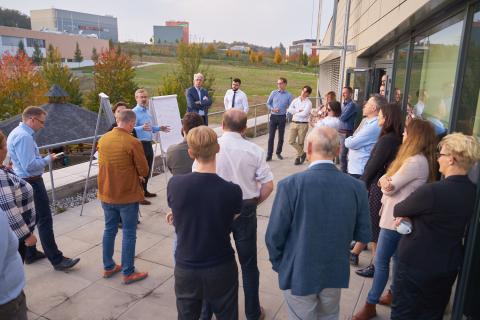Digital transformation in Trnava

On 25 and 26 June 2025, the Trnava Self-Governing Region, Slovakia, hosted a peer review to reflect on its current efforts and future ambitions in digital transformation across the territory. The focus was on three main areas:
- Scaling IoT across the territory
- Developing a regional approach to AI and data platforms
- Improving digital public services and cybersecurity
Trnava Region has a solid foundation to build on. Political leadership is in place, there is strong engagement from stakeholders, and pilot initiatives have already been launched. The region benefits from a strategic geographic position, a vibrant university ecosystem, and good conditions for both citizens and visitors. However, more needs to be done to connect the dots between initiatives, ensure coordination across levels, and fully unlock the region’s digital potential.
Peers from across Europe
The peer review was supported by the Thematic Experts for a Smarter Europe, Luc Schmerber and Laura Varisco. And brought together peers from four regions with relevant experience:
- Mathias Murmylo, ARNIA, Burgundy-Franche-Comté, France
- Esther Linask, City of Tallinn, Estonia
- Marta Martorell, i2CAT Foundation, Catalonia, Spain
- Gwennaelle Costa Le Vaillant, Paris Region, France
Key insights and recommendations
Discover some of the key insights and recommendations of the peer review. The full report will be published shortly.
The region is already testing IoT applications, but scaling requires clearer governance, better communication with municipalities, and shared resources. Peers recommended:
- Start small with motivated towns and apply a Living Lab approach to co-develop solutions with local actors.
- Set up a regional one-stop-shop to support municipalities with project management, funding access, and procurement processes.
- Train local stewards to maintain systems and engage telecom partners in regular coordination to ensure long-term sustainability.
Peers stressed the importance of setting clear ambitions and defining the region’s values related to AI, such as transparency, digital inclusion, gender equality etc. The main recommendations included:
- Create a regional AI and Data Lab to structure innovation and support experimentation.
- Focus on low-barrier/high-impact use cases, such as AI tools for public administration or basic citizen services.
- Adapt training programmes to different audiences—from civil servants to citizens—and build on existing initiatives like caféAI.
- Encourage collaboration with universities through targeted grants, internships, and co-financed research.
Peers underlined the need to strengthen both technical capacities and trust. Awareness-raising was seen as essential, including through regional campaigns, interactive formats such as quizzes, and engaging initiatives like a Cyber-bus. Other key recommendations included:
- Setting up a regional cyber coordination network to facilitate experience-sharing and joint response across institutions.
- Deploy password management tools, implement two-factor authentication, and conduct cyberattack simulations as immediate technical measures.
- Prepare incident response protocols and ensure that municipalities have access to emergency cybersecurity support.

Request your peer review
Are you interested in receiving feedback from peers on a regional policy challenge? Request your peer review.
